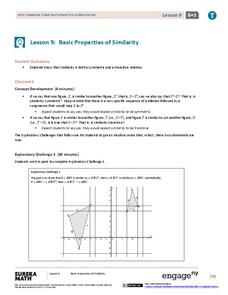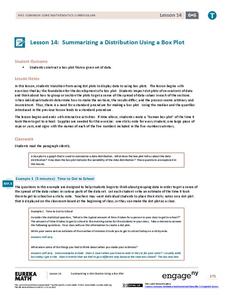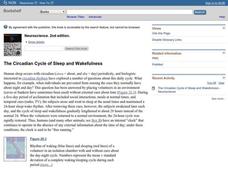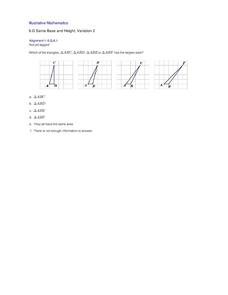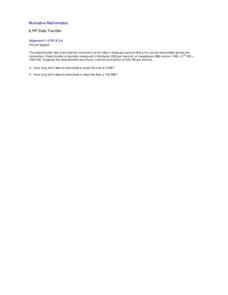EngageNY
Basic Properties of Similarity
Does the symmetry and transitive property apply to similarity? The 10th segment in a series of 16 presents the class with a group of explorations. The explorations have pairs show that similarity is both symmetrical and transitive....
EngageNY
Summarizing a Distribution Using a Box Plot
Place the data in a box. Pupils experiment with placing dividers within a data set and discover a need for a systematic method to group the data. The 14th activity in a series of 22 outlines the procedure for making a box plot based...
EngageNY
True and False Number Sentences II
Substitution is still the method of choice to verify number sentences. The detailed lesson has young mathematicians determining conditions for when number sentences are true or false through substitution. They learn to express these...
Illustrative Mathematics
Running to School, Variation 2
Rose's commute to school is a fractional distance. After she runs part of the way, your class needs to determine what fractional distance she ran. This problem explores fraction operations through modeling and computation. The...
Illustrative Mathematics
Half of a Recipe
Kids love to cook! What is a better place to learn mixed numbers than with a recipe? It is up to learners to decide how they want to divide this recipe in half. They may choose to model the mixed number and then divide the model by two....
California Education Partners
Quest for Tree Kangaroo
A three-day assessment challenges scholars to read a passage from an informational text then complete two activities that lead to a writing assignment. Day one and two begin as readers independently read a passage and tag the most...
EngageNY
Estimating Digits in a Quotient
Boiling down any division problem to a one-digit divisor problem sure makes estimation easy. The lesson shows how to estimate division problems by using place value understanding and basic arithmetic facts to simplify the division. Some...
Illustrative Mathematics
Proportional Relationships, Lines, and Linear Equations
The resource is a good introduction to what makes a proportional relationship between two lines. Discuss the similarities of both lines and the possibility of intersection. Use this opportunity to list other acceptable forms of each...
Illustrative Mathematics
Watch out for Parentheses
It is important for the algebra learner to understand the use of parentheses. Mathematicians of all levels can make errors with nested parentheses. This will give them some practice. It makes for a good class starter or quick assessment.
Illustrative Mathematics
Fractions and Rectangles
Visual models are excellent teaching tools when explaining equivalent fractions. Looking at a rectangle cut into twelfths, learners first identify the shaded fraction, and then explain whether the fraction is equal to one-fourth....
Curated OER
Choral Counting I
Using a 100s chart or a number line with a pointer, work with your class to count up to 100 by ones and tens. As a part of daily instruction, prompt your kindergartners to chant count from 1 to 30. Move on to 1 to 50, and then from 1 to...
Illustrative Mathematics
Making Hot Cocoa, Variation 1
Dividing with fractions can be a confusing task to some, but the activity illustrates how to make groups out of the problem and look at it visually. Use this problem with the instructional activity in the Additional Materials section to...
Illustrative Mathematics
Making Hot Cocoa, Variation 2
Learners are introduced to dividing by fractions in a visual way. Setting up groups from the information in the problem allows them to see what we divide and why. Use with the previous lesson, which can be found in Additional Materials,...
Illustrative Mathematics
The Stamp Collection
By using language like "half of the stamps," children are exposed to patterns in arithmetic that requires solving a two-step word problem. This type of language opens a new door for transitioning learners toward understanding fractions...
Illustrative Mathematics
Molly's Run
A simple lesson with a lot of support behind it. Your learners will find out how long it takes Molly to run a mile by choosing their solution method. The activity can be used as a lesson or as an independent assignment. Preface with...
Illustrative Mathematics
Same Base and Height, Variation 2
This is a good model for learners to visualize triangles of the same base and height. They can can begin to comprehend that these triangles will have the same area no matter how the triangle is drawn. It is part of a series of resources...
Curated OER
Which is Closer to 1?
A seemingly simple question that reveals a lot about a student's understanding of fractions. In finding an answer, learners compare fractions with different denominators that are both greater and less than one. No number line is...
Curated OER
Drinking Juice
Pictures, number lines, decimal equivalents, or Cuisenaire rods can be used to show insight into the meaning of multiplying fractions.Here, Alisa drinks 3/4 of 1/2 liter of juice. To find the total volume of the juice that Alisa...
Illustrative Mathematics
Start/Stop Counting II
Take stroll around the classroom while teaching young mathematicians to count fluently with this whole-group math activity. The teacher starts things off by walking around the room while counting up from the number one and continues...
Illustrative Mathematics
Comparing Rational and Irrational Number
Algebra learners must know how to use rational numbers to approximate irrationals. This resource asks participants to decide which number is larger without using a calculator. It makes a great exercise to use as a five-minute transition...
Illustrative Mathematics
Data Transfer
A question to ask your class is, How fast is your Internet? That depends on the data transfer rate (DTR), which is the unit rate used in this activity. Math students will calculate how long it takes to download a music file and a video...
Curated OER
Pick a Number, Counting On
This is a quick learning game that can be played on a daily basis during transitions or as a part of the morning meeting. Using number cards or numbers placed on sticks, pick a number at random. Read the number to the class and then ask...
Illustrative Mathematics
Voting for Two, Variation 4
After elections, the total amount of votes is not specified but the ratio of votes is. Your learners' job is to determine the fraction of votes John received above half of all votes. The problem can be solved abstractly or by other...
Illustrative Mathematics
Words to Expressions 1
Designed as a follow-up to the lesson plan titled Watch Out for Parenthesis 1, this activity asks young learners to write an equation for the calculation described with words rather than numbers and symbols. The treasure that 5th...
Other popular searches
- Using Transitions in Writing
- Writing Using Transitions
- Books Using Transitions
- Sentences Using Transitions
